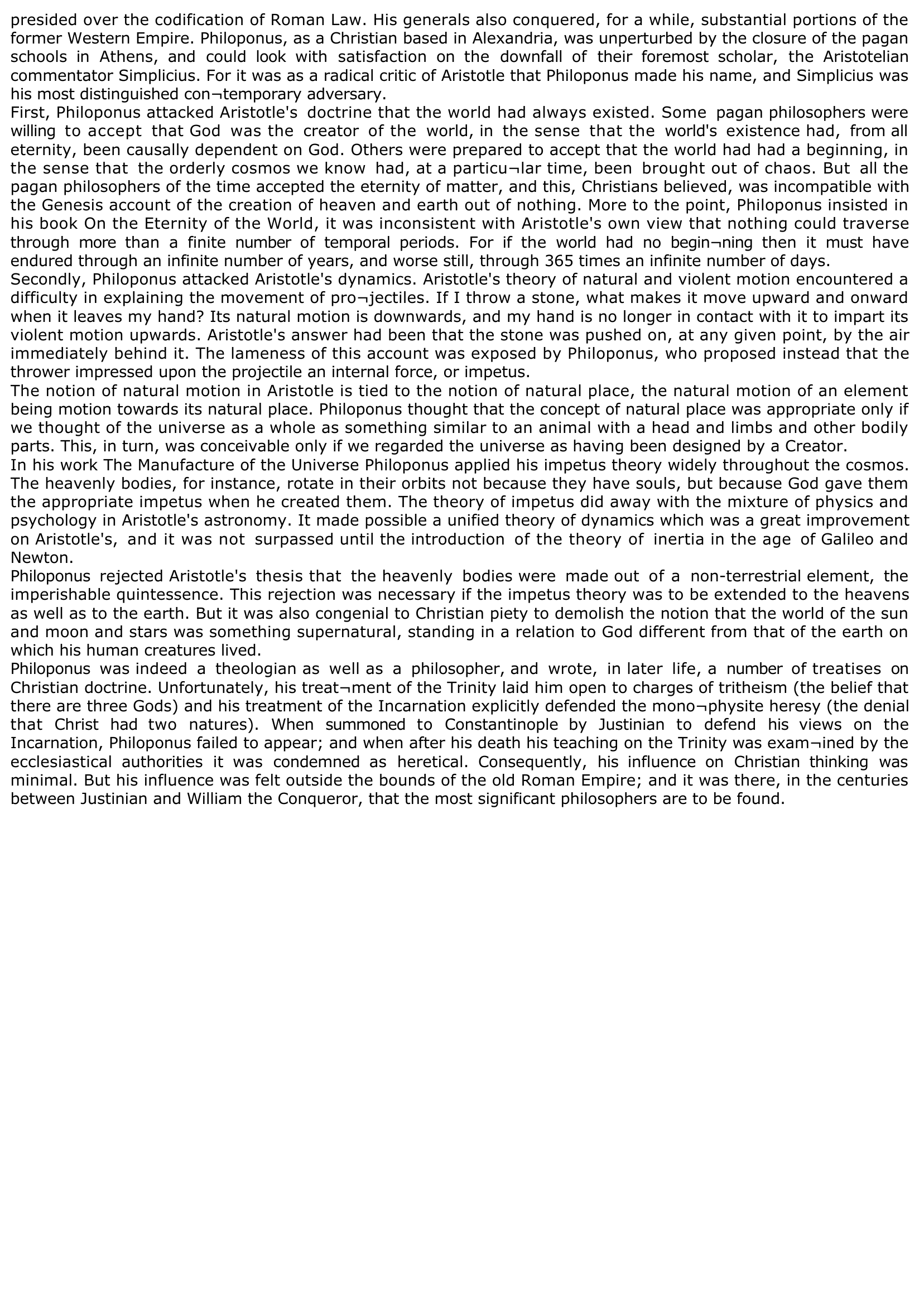Encyclopedia of Philosophy: BOETHIUS AND PHILOPONUS
Publié le 09/01/2010
Extrait du document
The sack of Rome by the Goths, which stimulated The City of God, was only the first of a series of barbarian attacks on the Western Empire and its metropolis. While Augustine was dying, the Vandals were at the gates of Hippo; before long they were masters of much of Africa and Spain. In mid-century the Huns invaded Gaul and Italy and only the eloquence of Pope Leo prevented them from attacking Rome. The Franks occupied Gaul, the Anglo-Saxons invaded Britain. In 476 the Western Roman Empire came to an end, and its last Emperor, Romulus Augustulus, was packed off into exile. Italy became a Gothic province, under Arian Christian kings.
«
presided over the codification of Roman Law.
His generals also conquered, for a while, substantial portions of theformer Western Empire.
Philoponus, as a Christian based in Alexandria, was unperturbed by the closure of the paganschools in Athens, and could look with satisfaction on the downfall of their foremost scholar, the Aristoteliancommentator Simplicius.
For it was as a radical critic of Aristotle that Philoponus made his name, and Simplicius washis most distinguished con¬temporary adversary.First, Philoponus attacked Aristotle's doctrine that the world had always existed.
Some pagan philosophers werewilling to accept that God was the creator of the world, in the sense that the world's existence had, from alleternity, been causally dependent on God.
Others were prepared to accept that the world had had a beginning, inthe sense that the orderly cosmos we know had, at a particu¬lar time, been brought out of chaos.
But all thepagan philosophers of the time accepted the eternity of matter, and this, Christians believed, was incompatible withthe Genesis account of the creation of heaven and earth out of nothing.
More to the point, Philoponus insisted inhis book On the Eternity of the World, it was inconsistent with Aristotle's own view that nothing could traversethrough more than a finite number of temporal periods.
For if the world had no begin¬ning then it must haveendured through an infinite number of years, and worse still, through 365 times an infinite number of days.Secondly, Philoponus attacked Aristotle's dynamics.
Aristotle's theory of natural and violent motion encountered adifficulty in explaining the movement of pro¬jectiles.
If I throw a stone, what makes it move upward and onwardwhen it leaves my hand? Its natural motion is downwards, and my hand is no longer in contact with it to impart itsviolent motion upwards.
Aristotle's answer had been that the stone was pushed on, at any given point, by the airimmediately behind it.
The lameness of this account was exposed by Philoponus, who proposed instead that thethrower impressed upon the projectile an internal force, or impetus.The notion of natural motion in Aristotle is tied to the notion of natural place, the natural motion of an elementbeing motion towards its natural place.
Philoponus thought that the concept of natural place was appropriate only ifwe thought of the universe as a whole as something similar to an animal with a head and limbs and other bodilyparts.
This, in turn, was conceivable only if we regarded the universe as having been designed by a Creator.In his work The Manufacture of the Universe Philoponus applied his impetus theory widely throughout the cosmos.The heavenly bodies, for instance, rotate in their orbits not because they have souls, but because God gave themthe appropriate impetus when he created them.
The theory of impetus did away with the mixture of physics andpsychology in Aristotle's astronomy.
It made possible a unified theory of dynamics which was a great improvementon Aristotle's, and it was not surpassed until the introduction of the theory of inertia in the age of Galileo andNewton.Philoponus rejected Aristotle's thesis that the heavenly bodies were made out of a non-terrestrial element, theimperishable quintessence.
This rejection was necessary if the impetus theory was to be extended to the heavensas well as to the earth.
But it was also congenial to Christian piety to demolish the notion that the world of the sunand moon and stars was something supernatural, standing in a relation to God different from that of the earth onwhich his human creatures lived.Philoponus was indeed a theologian as well as a philosopher, and wrote, in later life, a number of treatises onChristian doctrine.
Unfortunately, his treat¬ment of the Trinity laid him open to charges of tritheism (the belief thatthere are three Gods) and his treatment of the Incarnation explicitly defended the mono¬physite heresy (the denialthat Christ had two natures).
When summoned to Constantinople by Justinian to defend his views on theIncarnation, Philoponus failed to appear; and when after his death his teaching on the Trinity was exam¬ined by theecclesiastical authorities it was condemned as heretical.
Consequently, his influence on Christian thinking wasminimal.
But his influence was felt outside the bounds of the old Roman Empire; and it was there, in the centuriesbetween Justinian and William the Conqueror, that the most significant philosophers are to be found..
»
↓↓↓ APERÇU DU DOCUMENT ↓↓↓
Liens utiles
- Encyclopedia of Philosophy: HYPOTHESES AND SOCIAL LAWS - COMTE
- Encyclopedia of Philosophy: THE CHARACTER AND ORGANIZATION OF THE SCIENCES - COMTE
- Encyclopedia of Philosophy: Bentham and James Mill
- Encyclopedia of Philosophy: AL-R-Z/ AND AL-F-R-B/
- Encyclopedia of Philosophy: Spinoza and Malebranche

































